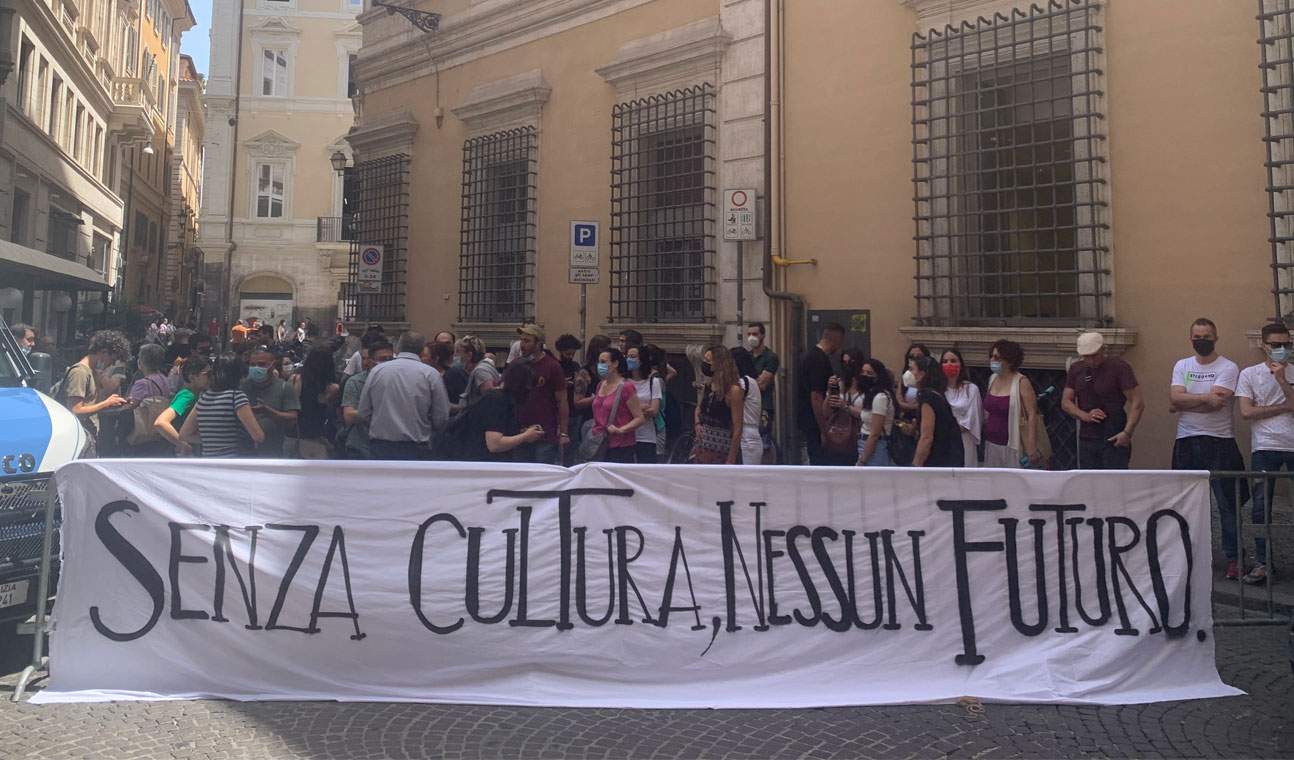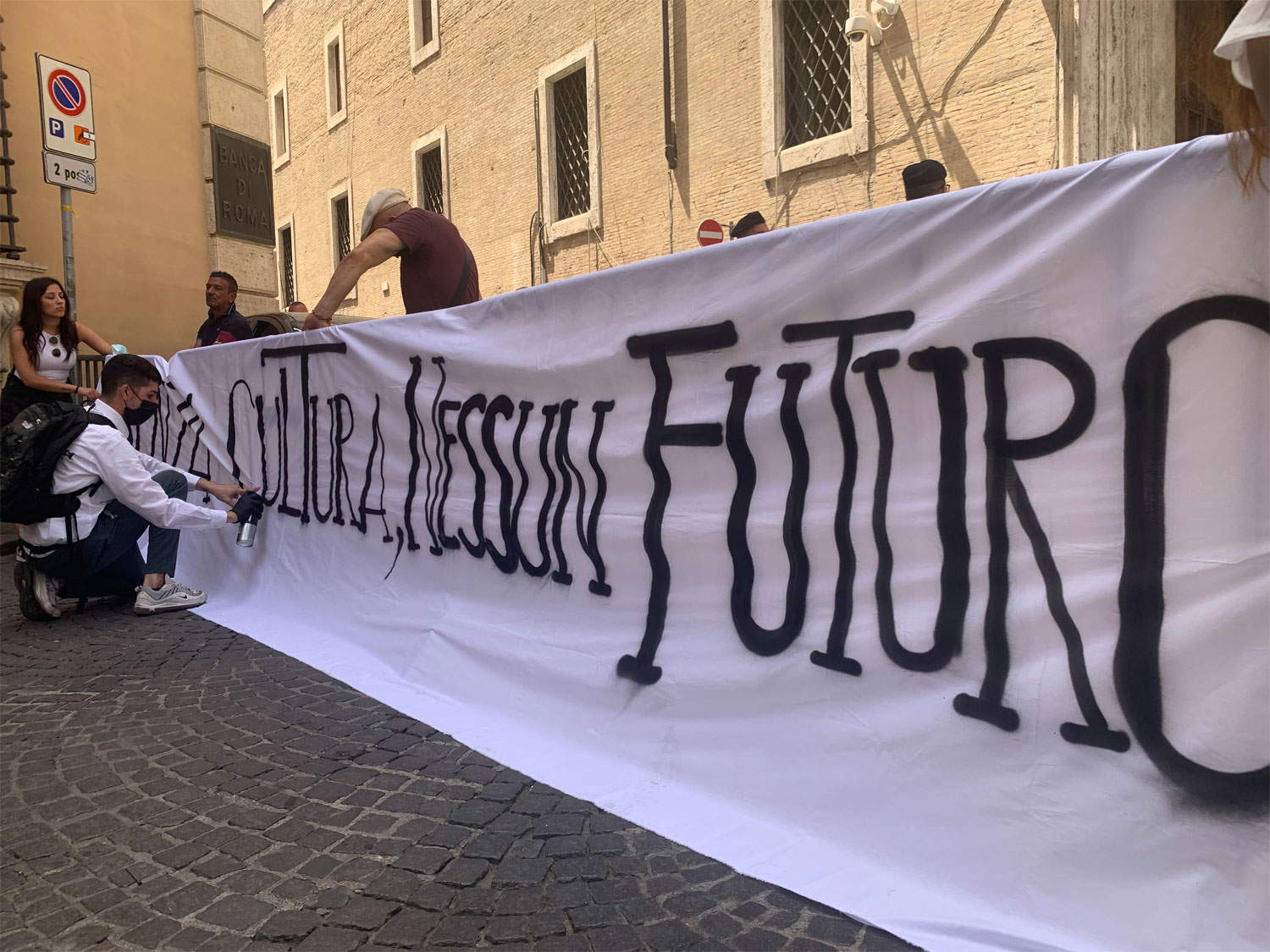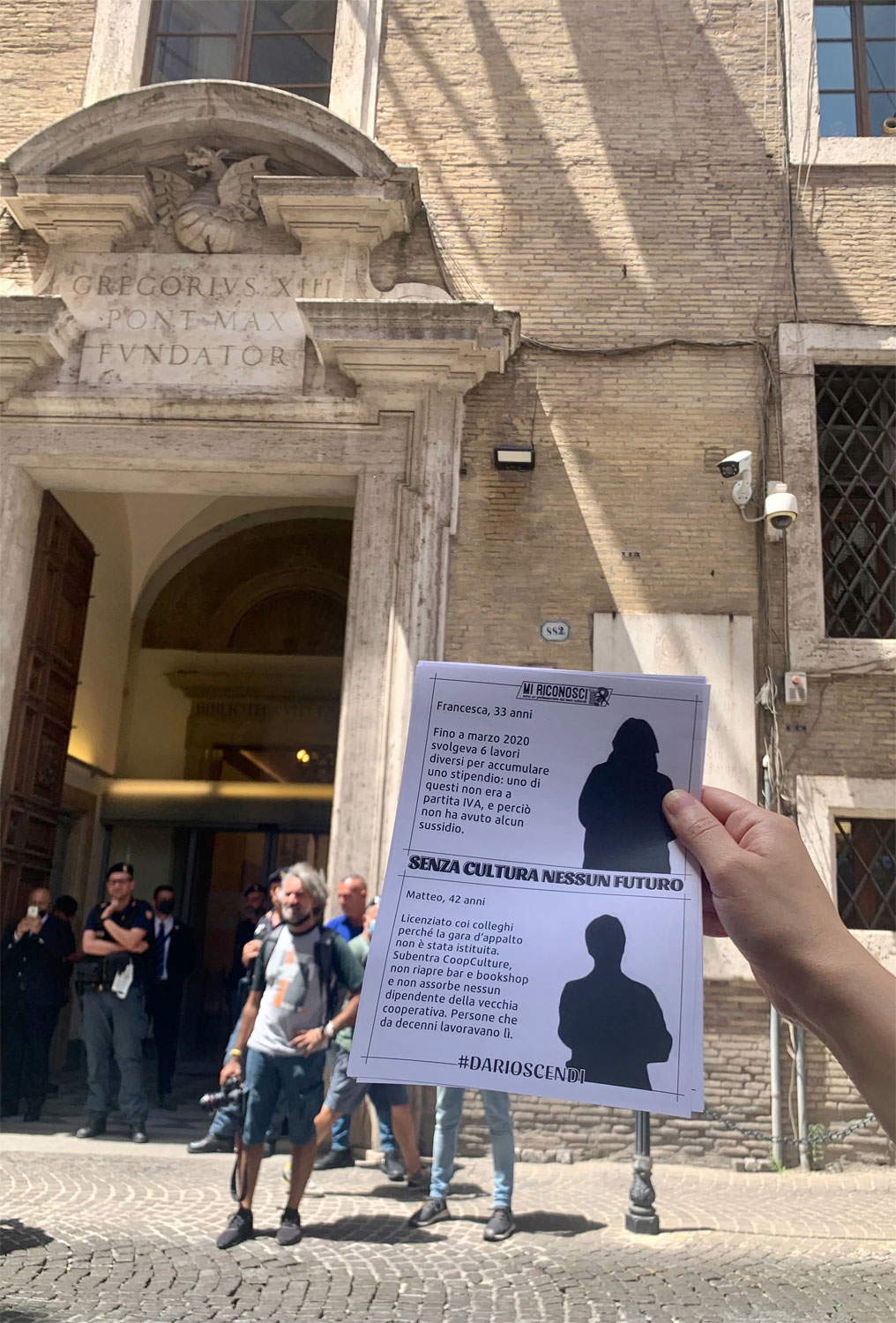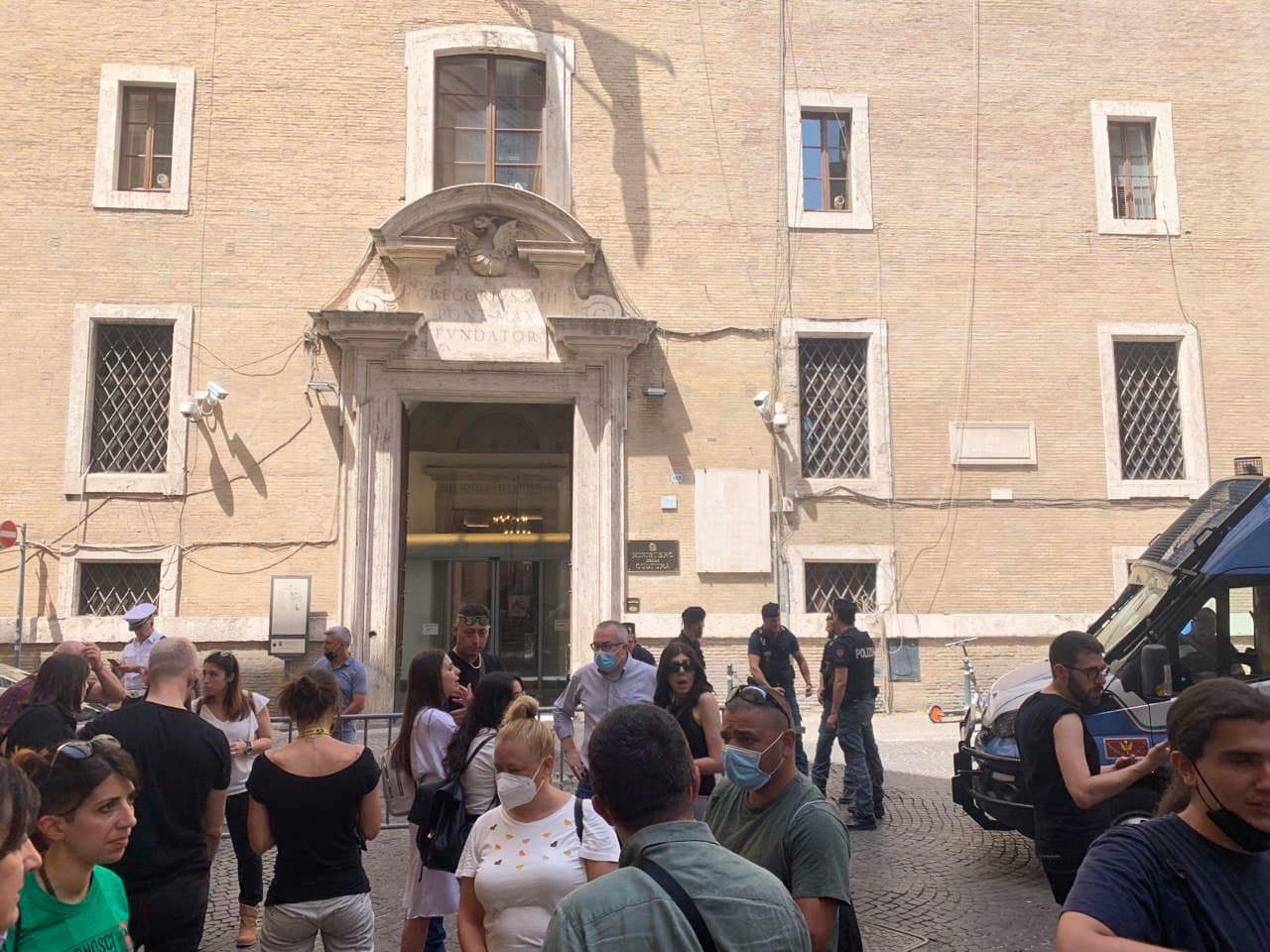Culturalworkers took to the streets in Rome this morning to protest against outsourced labor conditions directly in front of the Ministry of Culture headquarters on Via del Collegio Romano. The demonstration was organized by the association Mi Riconosci and received endorsements from several unions: UCLAS, UILPA, COBAS Private Labor, USB Culture and Entertainment, and the Young Democratic Federations of Rome, Lazio, Marche, Trentino, Venice, Padua, Emilia-Romagna, and Tuscany, as well as many citizens.
The demonstration was attended by workers from all over Italy and active at different facilities (museums, libraries, archaeological parks), each with a different story of exploitation and abuse. From Taranto, where museum workers lost their jobs after twenty years, replaced by unapp, and then again from Ostia Antica, where the contract for bookshop and ticketing was not put out to tender and twelve workers lost their jobs, from Palazzo Barberini in Rome, where increasingly unfavorable contractual conditions and lower and lower hourly wages are being reported for outsourced workers, despite the fact that the presence of such men and women workers is indispensable, and then again from Pompeii, where in the face of a continuous increase in receipts until 2019, dozens of outsourced workers have seen their compensation stopped at 7 euros per hour. All of this compounded by the collapse of tourism, which has imposed worse hours, fewer benefits, fewer prospects, and thus a collapse of rights for workers but also a collapse of service quality for citizens.
Protesters chanted slogans such as Basta esternalizzazioni and Dario scendi, while handing out leaflets telling stories of cultural workers. A group of protesters drew the main slogan of the demonstration (“Without culture no future”) on a banner displayed in front of the Ministry. After requesting several times to be received by the ministerial leadership, a delegation of two activists met with the Chief of Cabinet, Lorenzo Casini. For the umpteenth time we asked for a meeting with Minister Franceschini, because we believe that reforming the Italian cultural system, overcoming the logic of mass tourism and economic exploitation, to build a National Cultural System that instead offers quality services to citizens and for citizens, is the only possible alternative to avoid a cultural and social collapse. Overcoming the current system of outsourcing, guaranteeing decent work, seems urgent and necessary, the promoters of the demonstration conclude. The organizers guarantee that this will be only the first in a series of mobilizations that will characterize the summer of cultural heritage workers.
 |
| A moment of the demonstration |
 |
| A moment of the demonstration |
 |
| A moment of the demonstration |
 |
| A moment of the demonstration |
“As workers of the ben cultural we are angry and frustrated, the situation is increasingly untenable, we have colleagues who are in danger of eviction or who have had to change jobs after twenty years,” says Eleonora Fossi of the association Mi Riconosci, “but despite all this being evident and known for a long time, despite the fact that we have never lacked proposals for reform, the Ministry in recent months has decided not to listen to the voice of these workers preferring to entrench itself in the preservation of a system based on profits for the few and exploitation and damage for the many. That is why we are here.”
“Today, in front of the Ministry of Culture,” says Daniela Pietrangelo of Mi Riconosci, “we professionals and professionals in the cultural sector, or would-be professionals, brought together by the association Mi Riconosci, have decided to demonstrate by accepting the request of outsourced and exploited workers from all over Italy. The Ministry in these 15 months since the beginning of the first lockdown, in which all the contradictions of a cultural sector that has been poorly organized and mismanaged for decades have exploded, has decided not to listen to the many analyses and proposals produced by us workers, preferring to distribute windfall subsidies to all those who have gone into crisis with these months of the collapse of tourism, aiming to achieve the crystallization of the previous system in search of a restart that without a structural reform can never be. The stories of the workers in the square today testify to how this recipe has already proven to be a failure, for Heritage, for those who work there, and for the entire country system.”
“Following the change of contract to all the workers, who had applied the Federculture CCNL,” says Enzo Miccoli, USB rsa delegate at the Reggia di Venaria, “all rights have been reset to zero and the multiservice company CoopCulture applied. We are taking to the streets because museum workers must rebel against a situation of exploitation and precarity that has been going on for years and on which the culture model of our ruling classes is based. Contracts and subcontracts are the problem, minimum wage by law and internalizations the solution.”
“It is evident of how it is a matter of social justice and respect for constitutional dictates, also in view of the avid shortage of personnel certified by the Superior Council of Cultural Heritage itself,” says Luigi Napolitano, COBAS private labor, a worker in Pompeii. “In 2020, 500 hires have been planned through the employment centers among the long-term unemployed with the qualification of the middle school diploma, that is, a recruitment of new personnel who will carry out the same tasks that for more than twenty years have been carried out by workers from private contracting companies who evidently already have some specific work and professional experience. Well, this many years of work experience is not recognized to them and has never been taken into account in the slightest in public competitions or even by employment centers. We claim linternalization as a definitive solution to the precarious regime just as cultural associations, movements, committees, insiders and other grassroots unions have also been doing for years.”
“Within the serious employment crisis that grips our country,” declares Federico Trastulli of UILPA cultural heritage, “is hidden, as in a matryoshka, that of precariousness. Especially youth. From this point of view, the cultural sector is no exception. And while it is true that in the collective opinion something is beginning to change and that the rules for competitions that are supposed to breathe new life into the Civil Service have seen a major simplification, it is also true that recruitment times are always too long (also due to external conditions, no doubt) and poorly matched with the desperate hurry we are in to hire new, qualified, possibly young staff. Here, then, today’s demonstration is in line with a feeling of common solidarity with the thousands of contracted precarious workers in PA and the hundreds of workers employed in the cultural sites of our Ministry, staff who are now experienced because they have been in service for decades but with indecent salaries and few prospects for stabilization. Solidarity that, however, must translate into concrete actions. Serious competitions, at regular intervals and taking into account previous experience. The public administration could start by using the Madia law to regularize precarious workers and plan selections aimed at replenishing a national workforce that has reached 50 percent depletion. The road seems to us to be mapped out: certainly it is impervious but it is worth walking it. The UILPA is willing to take its share of responsibility and commitment.”
“Since May 2002,” says Chiara, a museum worker in Rome for 20 years, “I have worked and work for three of the most important state museums in Rome. I was and am in charge of reception and supervision. Despite my growing and now proven experience and training given to me by the Ministry itself, I have never had contracts that lasted more than 4 months and I have changed about 13 companies. Despite the apparent continuity I can consider myself a ’dated’ temp. The problem is not the places, the facilities in which we work: my complaint is about the system that is wrong. For years there have been no competitions, for years museums have been emptied and we have been used that sooner or later we will be left at home. So let’s not fossilize on the structures, it’s rotten the system and that’s what our ministry needs to change.”
“My colleagues and I,” says Matteo, a former operator at Ostia Antica, on the other hand, “were fired because the tender was not set up. For 20 years we worked between the bar, ticket office and bookshop. With an expression of interest a new cooperative (CoopCulture) took over, and it did not arrange for either the reopening of the bar or the bookshop, and above all it did not absorb any of the employees of the old cooperative. Thus we found ourselves without jobs, while the site found itself with fewer services. This happened to us but also in many other Italian sites, particularly after the 2020 lockdown.”
 |
| Outsourced culture workers demonstrate in Rome: "Stop abuse, reform the sector" |
Warning: the translation into English of the original Italian article was created using automatic tools. We undertake to review all articles, but we do not guarantee the total absence of inaccuracies in the translation due to the program. You can find the original by clicking on the ITA button. If you find any mistake,please contact us.